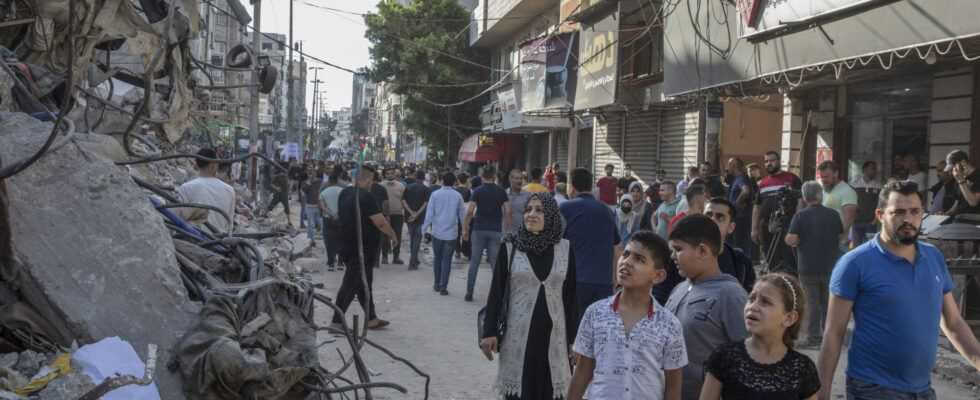ReportageOn the first day of the ceasefire, Gazans wander through the ruins and celebrate their new-found freedom.
He stands out of the crowd like a ghost, his arms covered with long, healing wounds and splinter marks. He is shaking. His eyes sink strangely into his skull. Mohammed Al-Kolak is a miracle. The 24-year-old man and his mother survived the collapse of the building where his family lived on Al-Wehda Street in central Gaza. Friday, May 21, on the first day of a ceasefire that ends eleven days of Israeli bombing, residents of his city come here with their families, to see with their own eyes these huge piles of rubble.
Some greet, as neighbors, the two families who suffered the worst massacre of this war, Sunday May 16. The Al-Kolak clan counts twenty-two dead – a list of their names is displayed at the entrance of the tent where Mohammed will wander until late, receiving condolences for three days. Their neighbors, the El-Ouf, deplore sixteen deaths.
That night, Mohammed hung out for a long time in the small convenience store he runs with his three brothers. They opened it two months ago at the foot of their building: a family investment. Mohammed had dreamed of another job: he studied industrial design. But in Gaza, 70% of the youth are unemployed. In the group of friends in his neighborhood, which today builds a rampart around him – there is a lawyer, two accountants, a journalist – Mohammad is the only one to receive a salary.
It’s a dreary and tense evening. Almost not a customer. Al-Wehda Street, usually one of the busiest in the city center, is deserted. At midnight, Mohammed lowers the curtain and goes up to the second floor of this building built by his grandfather, one of the two contiguous buildings, of three and four floors, where a whole clan of the Gazan middle class resides.
“Days become nights”
Nobody sleeps up there. Israeli strikes echo at random intervals. “With the bombardments, days become nights and nights become days”, describes Mohammed. One of his older brothers, who lives west of the city, returned here at the start of the war to shelter his wife and their 6-month-old baby, Qoussai. They consider this central district, located a stone’s throw from Gaza’s largest shopping center, to be safer. Mohammed takes the child to play with him in his room. He owns one of his own, it is a luxury in Gaza, this confetti of sand, this 41-kilometer-long beach where 2 million souls huddle together, under Israeli blockade since 2007. Mohammed never left it.
You have 72.04% of this article left to read. The rest is for subscribers only.
